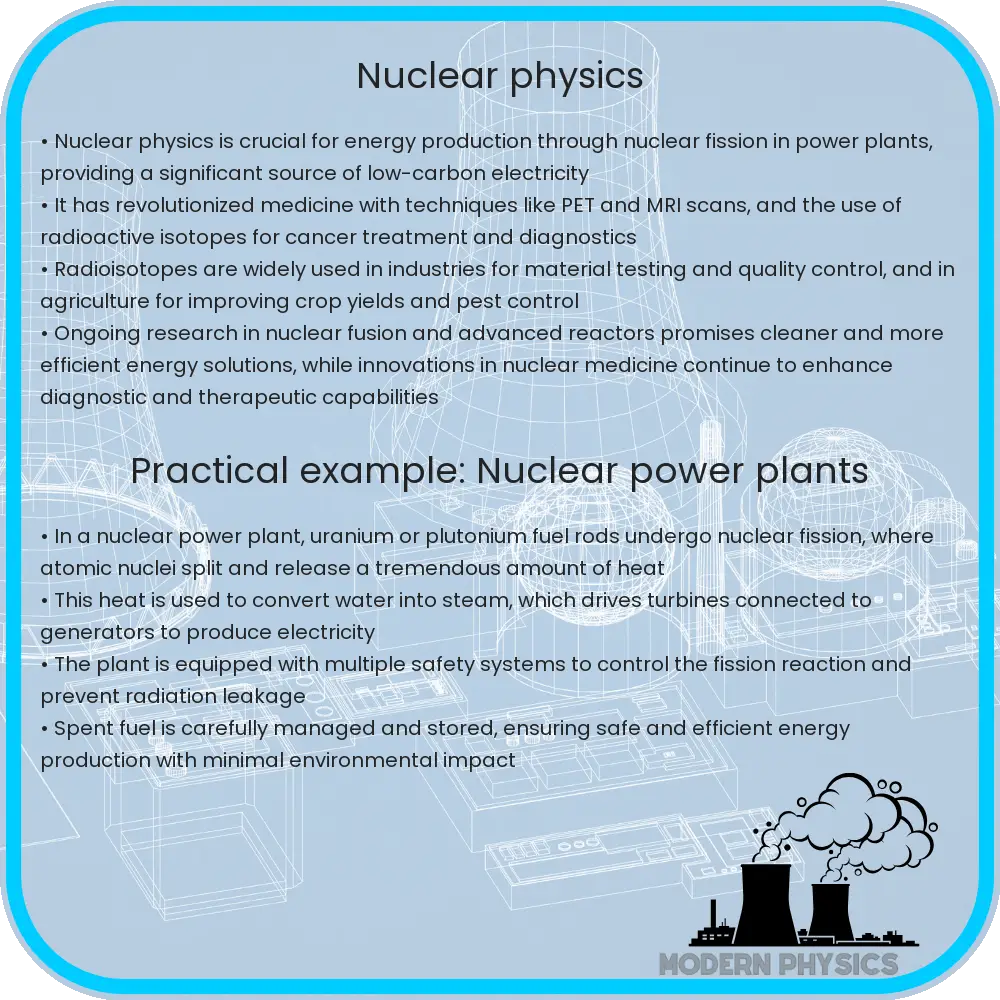Explore the fundamentals of nuclear physics, its diverse applications in energy, medicine, and industry, and the exciting future prospects in nuclear fusion and advanced reactors. Discover how nuclear physics continues to shape our world.

Nuclear Physics: Fundamentals, Applications, and Future Perspectives
Nuclear physics is a branch of physics that deals with the study of atomic nuclei, their composition, and their interactions. This field has led to groundbreaking discoveries and technologies that have significantly impacted modern society. In this article, we will explore the basic principles of nuclear physics, its applications, and future perspectives.
Basic Principles of Nuclear Physics
The atomic nucleus is the central part of an atom, composed of protons and neutrons, held together by the strong nuclear force. Protons are positively charged particles, while neutrons are neutral. The number of protons, known as the atomic number, determines the chemical element, while the total number of protons and neutrons gives the atomic mass.
Nuclear physics primarily focuses on understanding the forces and interactions within the nucleus. The strong nuclear force is the fundamental force responsible for binding protons and neutrons together. Despite its strength, this force operates over a very short range, roughly the diameter of a nucleus. Additionally, nuclear physics examines radioactive decay, nuclear reactions, and the behavior of isotopes, which are atoms of the same element with different numbers of neutrons.
Applications of Nuclear Physics
- Energy Production: One of the most well-known applications of nuclear physics is in the generation of energy. Nuclear power plants use nuclear fission, the process of splitting a heavy nucleus into lighter nuclei, releasing a significant amount of energy. This energy is harnessed to produce electricity. Despite concerns about safety and radioactive waste, nuclear power remains a crucial component of the global energy mix, providing a low-carbon alternative to fossil fuels.
- Medical Applications: Nuclear physics has revolutionized the field of medicine. Techniques such as positron emission tomography (PET) and magnetic resonance imaging (MRI) rely on principles of nuclear physics to provide detailed images of the body’s internal structures. Additionally, radioactive isotopes are used in cancer treatment (radiotherapy) and diagnostics, allowing for precise targeting of tumors and early detection of diseases.
- Industrial and Agricultural Uses: Radioisotopes are employed in various industrial applications, including material testing, quality control, and tracing the movement of substances. In agriculture, nuclear techniques are used to improve crop yields, pest control, and food preservation, enhancing food security and safety.
- Scientific Research: Nuclear physics continues to be a vital area of research, with scientists investigating the fundamental properties of matter and the universe. Research facilities like CERN’s Large Hadron Collider and various nuclear reactors around the world provide critical insights into particle physics, cosmology, and the origins of the universe.
Future Perspectives
The future of nuclear physics holds exciting prospects, driven by advancements in technology and a deeper understanding of fundamental processes. Some of the key areas of development include:
- Nuclear Fusion: Unlike nuclear fission, fusion involves combining light nuclei to form heavier nuclei, releasing energy. Fusion has the potential to provide a virtually limitless and clean source of energy. While significant technical challenges remain, ongoing research and experiments, such as those at the International Thermonuclear Experimental Reactor (ITER), aim to make fusion energy a viable reality.
- Advanced Nuclear Reactors: The development of next-generation nuclear reactors promises to enhance safety, efficiency, and sustainability. These reactors, including small modular reactors (SMRs) and thorium reactors, aim to address the limitations of current nuclear power plants and expand their applications.
- Nuclear Medicine Innovations: Continued advancements in nuclear medicine are expected to lead to more precise diagnostic tools and targeted treatments, improving patient outcomes. Research into new radioisotopes and imaging techniques will further expand the capabilities of medical diagnostics and therapies.
- Environmental and Security Applications: Nuclear physics will play a crucial role in addressing environmental challenges, such as climate change and nuclear waste management. Additionally, it will continue to contribute to national and global security through the detection and prevention of nuclear proliferation and terrorism.
Conclusion
Nuclear physics is a dynamic and impactful field, with wide-ranging applications that benefit society in numerous ways. From energy production and medical advancements to scientific research and industrial applications, the principles of nuclear physics underpin many modern technologies. As research and development continue, the future of nuclear physics promises even greater innovations and solutions to some of the world’s most pressing challenges.
